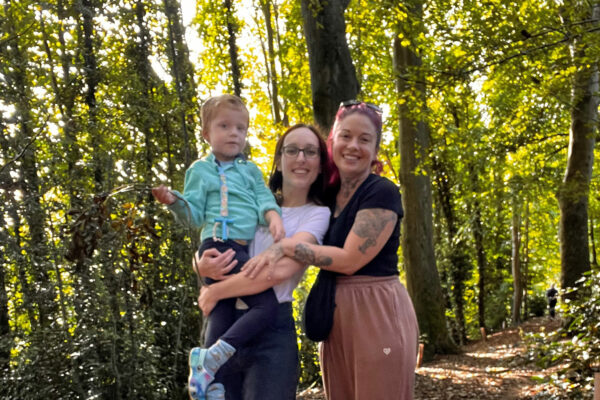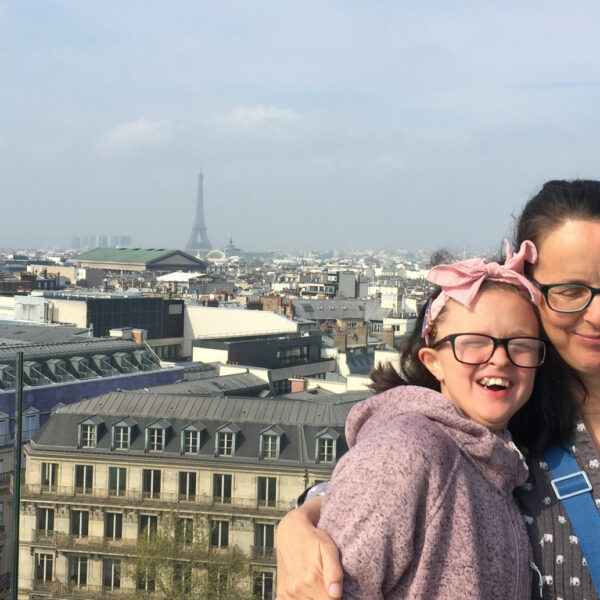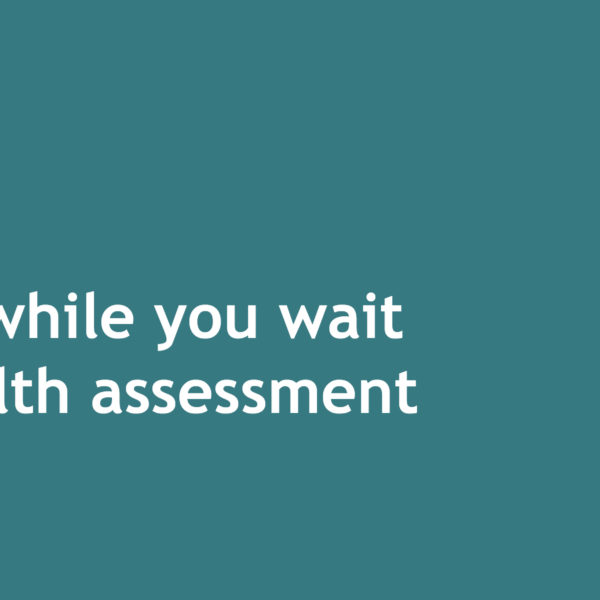Getting a diagnosis
Some parents will find out their child has additional needs early on; you may be told during the pregnancy or just after the birth, or a health visitor might spot something in one of the early check ups and refer you for assessments.
Other families are shocked when nursery or school pick up difficulties in learning or social interaction that they hadn’t noticed or don’t agree with.
For many of us, however, there is a gradual awareness and growing conviction that our child is not developing at the same rate or in the same way as their peers or siblings and we’ll want to find out why.
The first step is always to speak to a professional who can help.
Who can help?
Depending on your child’s age, the first people you will usually talk to about any problems will be your health visitor, GP, or someone at your child’s school or preschool.
Health visitors
If your child is under five, you should speak to your health visitor about any concerns. They are experts in early years child development and, as well as giving you advice on issues like breast-feeding, sleep and potty training, they can refer you for specialist assessments and support, if necessary.
There are specialist health visitors and nurses who can support children with additional needs up to 8 years old. They are based in the child development centres in Brighton & Hove and East Sussex.
GPs
You can speak to your GP about your concerns. They may refer you to a paediatrician who specialises in children’s health, or a consultant who specialises in particular conditions or parts of the body. Depending on their needs, your child may also be referred to specialist health teams such as Speech and Language Therapy (SALT) if they have difficulty communicating or swallowing, or Occupational Therapy if they need help to develop everyday skills.
A national charity, Contact, produces a useful guide, Concerned about your child [pdf] that explains which professionals or teams can help with particular issues.
School or nursery staff
If your child is at primary school, a preschool or nursery, you can speak to their class teacher or nursery worker. They may ask you to discuss your child’s difficulties in more detail with the Special Educational Needs Coordinator (SENCO) or Inclusion Manager at the setting. In secondary school, the SENCO, Inclusion Manager or school counsellor are appropriate people to contact.
Another person that you might talk to about your concerns at this point is the school nurse. Young people aged 11-19 can talk to school nurses themselves or text them with concerns.
In mainstream schools the school nurse is usually a visiting nurse, who is available termly. They can check your child’s health and development and refer you to other specialist health practitioners. Schools usually notify parents of upcoming visits and this is an opportunity to meet and discuss any health or medical concerns you may have.
Children who need additional support to access education may be referred for specialist assessment and educational support services through Brighton & Hove Inclusion Support Service or the SEND teams in Education East Sussex.
You can read about the special educational needs process in more detail in our Education section. The Education section also contains information on support for children with medical conditions in school.
Diagnosis later in education or beyond
Some children and young people may get through much of their childhood and school career before you or they think about getting an assessment or diagnosis for them. They may even be in college or beyond before it happens, perhaps starting higher education or looking for a job. This could be because their health (including mental health) changes or because their needs were not so obvious earlier. They may have just about managed until the curriculum or environment became more challenging, or perhaps they masked their difficulties or were seen as badly behaved or not trying at school. Masking is a particular issue for people who are neurodivergent. See Amaze's guide to Masking .
If a young person starts to run into difficulties in their teens or later, it is not too late to ask for assessment or diagnosis. Young people who have a change in their mental and emotional wellbeing may need mental health assessment and care, but in some cases, it may be there is an underlying learning difficulty or neurodevelopmental difference that has been missed. This can also be the case for young people who are getting into trouble with the law or involved in substance misuse. As with younger children, you may start by contacting a GP or with inclusion support services in their college. The young person will need to be involved in decision-making and consent to this.
Where you go for diagnosis in the NHS changes at 18. For example, there is an adult pathway for diagnosis for autism and ADHD. Find out more about autism and ADHD.
Waiting for a diagnosis
Getting a diagnosis can take quite a while. This may be due to waiting lists, but also because it can take a long time to gather the information and conduct the necessary observations. So, if you are worried about your child, flag your concerns with a professional and be prepared for a long wait until you get any answers.
The good news is that you do not need a diagnosis to get support.
In schools and nurseries, for example, if your child is identified as having a special educational need or disability (SEND), they are entitled to get any extra support they need to make progress, whether they have a diagnosis or not. We cover getting SEN support in school in much more detail in our Education section. Similarly you don’t necessarily need a diagnosis to claim Disability Living Allowance for your child as long as you have some supporting evidence about their extra needs.
There are other services that can help while you are waiting, too.
Amaze’s ND Family Support Service is for parents and carers whose child or young person is at any point on the assessment pathway for a neurodevelopmental difference such as autism and ADHD. You can access advice and guidance right from when a problem is first flagged, through assessment, diagnosis (or otherwise) and beyond.
You can also attend our parent support groups across Brighton & Hove and East Sussex and call our SENDIASS advice line for advice and information.
School health and wellbeing services have advice lines for any concerned parents of school-age children:
- For Brighton & Hove Schools Mental Health Service email [email protected] or call 01273 294411
- East Sussex School Health. Call or email 0300 123 4062 [email protected]
You may be able to attend workshops and groups for parent carers via learning support services such as BHISS in Brighton & Hove and CLASS (+) in East Sussex.
Read our page on Support while you wait for a neurodevelopmental pathway assessment for more information.
For details of other local services, see the Local Offer. This is your local authority’s online listing of in your area to children and young people with SEND and their families.
Private assessments
Long waiting times for some NHS assessments and limited availability of educational psychologist time in schools mean that some parents will think about seeking a private assessment or diagnosis. This can be expensive, so it is not an option for many families. If you are thinking about a private assessment, there are some important things to consider.
Speak to your child’s GP and school or college about what you are doing. You want them to be in the loop as you may be coming back to them later with the outcome or for follow up. Keep your child on any NHS waiting list regardless of also following a private option. This may be helpful later. For example, if your child is diagnosed privately for ADHD and medication is suggested, you will have to pay for private prescriptions but may eventually be able to move this to NHS care if they are on the CAMHS neurodevelopmental assessment waiting list. See Neurodevelopmental service for children and young people : Sussex Partnership NHS Foundation Trust
Make sure the person you use is appropriately qualified to carry out this particular assessment or diagnosis. Also check that they are registered with the right regulatory body. Apart from doctors and nurses, who have their own professional registers, this will usually be the Health and Care Professions Council (HCPC). For example, speech and language therapists, occupational therapists, psychologists, physiotherapists and dieticians all fall under the HCPC. You can check a practitioner is registered here https://www.professionalstandards.org.uk/check-practitioners
For some types of private assessment, you will also need to check that the practitioner or service you use will be following National Institute for Health and Care Excellence (NICE) guidelines. For example, there is NICE guidance about autism and ADHD, including recognised tools and approaches for an assessment process.
Using a properly qualified and registered person who complies with NICE guidance (where this applies) is a protection for your child and you, but will also be something your child’s school, local authority and NHS professionals will need to know when they look at whether to recognise any diagnosis or report. Generally, they should recognise the validity of a diagnosis or assessment if so. They will also look at whether the practitioner linked up with other professionals involved with the child, for example asking for information from the school. And if they are making recommendations about support, care or provision, that these are proportionate with the child’s needs and in line with evidence-based good practice.
Download our fact sheet on Private assessments and NHS Right to Choose (pdf 690kb) for more information.
Coping with your child’s diagnosis
Getting a diagnosis can be a huge relief. You may find that more types of support open up to you or that you feel more comfortable accessing support and groups now you know your child has a specific condition. See our Conditions and concerns section for information about a range of conditions including autism, ADHD and tics/Tourette syndrome or visit your Local Offer for information about services.
However, for some of us, getting confirmation or putting a name to our child’s needs can hit hard. You may be shocked, even if you were expecting a diagnosis, in denial, angry or just bereft. Some parents describe the time just after diagnosis as a period of grief, as you mourn the loss of the future you expected.
Listen to national disability charity Contact’s podcast about getting a diagnosis.
Most parents really benefit from talking to parents of children with similar conditions or finding befriending services that can help you through the difficult times.
Amaze runs a range of regular parent support groups for families of children and young people with SEND right across East Sussex and Brighton & Hove. At challenging times like diagnosis, we may also be able to match you with a volunteer befriender who is a parent carer with similar experiences.
To find out about other parent support groups in your local area, visit your Local Offer (see links at the bottom of this page).
Also, the specialist services who were involved in diagnosing your child may offer free counselling, courses or talks for parents of newly diagnosed children. Make sure you ask them about national support groups or charities for your child’s specific condition too.
Coping without a diagnosis
Getting a diagnosis that explains your child’s additional needs may take a long time. Some families will get vague diagnostic labels like ‘global development delay‘, some will start off being told their child has one thing, only for this to change years later.
Living with this kind of uncertainty can be frustrating and upsetting. It can be more of a struggle to get help or find a community of other parents who understand your experiences, but don’t let this put you off asking for the support you are entitled to.
You do not need a specific diagnosis to get extra support in school or college or to apply for benefits like Disability Living Allowance (DLA). Find out more about making a claim for DLA.
Similarly, if your child needs a therapeutic service such as physiotherapy or occupational therapy, this will be dependent on their needs rather than their condition.
And you don’t need a diagnosis to access any of Amaze’s services.
Read our fact sheet on Living without a diagnosis (pdf 750kb) for practical strategies that can help.
You can also download Contact’s guide for more advice on Living without a diagnosis.
Getting a second opinion
If you are not happy with the outcome of an assessment and your child is still struggling, or if you want someone to confirm a diagnosis that you are unsure about, you can seek a second opinion.
Your child’s GP or consultant is not legally obliged to refer you to another consultant for a second opinion but, in practice, many will be sympathetic and supportive if you ask for one.
Parents who can afford to might choose to approach consultants on a private basis (see the section above on Private assessments). Be aware that, apart from the expense, it is not always easy to discover for yourself which private consultant is an expert in any particular condition. You may be able to get advice about these matters from The Patients’ Association, the Care Quality Commission or your local branch of Healthwatch or PALS.
Get support from Amaze
Our ND Family Support service can support families with children and young people under 25 pre- and post-assessment for neurodevelopmental differences such as autism, ADHD and tics/Tourettes. This service is for families in Brighton & Hove and East Sussex.







